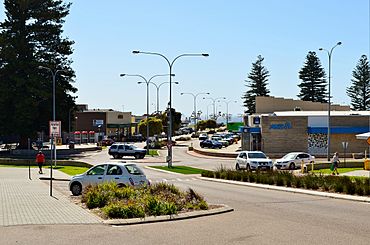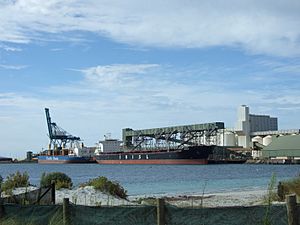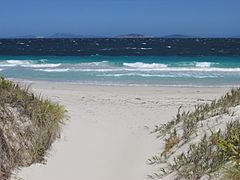Esperance, Western Australia facts for kids
Quick facts for kids EsperanceWestern Australia |
|||||||||
|---|---|---|---|---|---|---|---|---|---|

View of the Esperance CBD, 2012.
|
|||||||||
| Population | 13,883 (2021) | ||||||||
| Established | 1893 | ||||||||
| Postcode(s) | 6450 | ||||||||
| Elevation | 8 m (26 ft) | ||||||||
| Time zone | AWST (UTC+8) | ||||||||
| Location |
|
||||||||
| LGA(s) | Shire of Esperance | ||||||||
| State electorate(s) | Roe | ||||||||
| Federal Division(s) | O'Connor | ||||||||
|
|||||||||
Esperance is a town located in the Goldfields–Esperance area of Western Australia. It sits right on the Southern Ocean coastline. It's about 720 kilometers (447 miles) east-southeast of Perth, the state capital. The town is also 391 kilometers (243 miles) south of Kalgoorlie.
In June 2018, about 12,003 people lived in Esperance. The main ways people make a living here are through tourism, farming (agriculture), and fishing.
Contents
History of Esperance
Early Explorers and Settlers
The story of Esperance began a long time ago. In 1627, a Dutch ship called Gulden Zeepaert sailed past the coast of Esperance.
Later, in 1792, French explorers found shelter from a storm near where the town is today. They named the area and other spots nearby. The town itself was named after one of their ships, the Espérance. In French, "Espérance" means "hope".
In 1802, a British explorer named Matthew Flinders sailed through the Bay of Isles. He discovered and named places like Lucky Bay and Thistle Cove. After him, came whalers, sealers, and even pirates. Later, farmers and miners arrived, hoping to find land and gold.
First European Settlement
The first European family to settle in the Esperance town area were the Dempsters. They were from Scotland and arrived in the 1860s. The Dempster brothers were given a huge amount of land, about 304,000 acres (123,000 hectares). They first settled in 1864.
They brought sheep, cattle, and horses from Northam. In 1866, they started shipping animals to Esperance from South Australia. They even built Esperance's first landing spot for ships.
Growth of the Town
As more settlers moved to the Esperance coastal plain, a small community grew. It became an important stop for the Overland Telegraph line, which connected Albany and Eucla. A telegraph station opened in 1876. The town officially became a gazetted (recognized by the government) town in 1893.
A town jetty was built in the 1890s. This happened after gold was found in the eastern goldfields. Esperance then became known as the "gateway to the Goldfields." In 1898, the town had 985 people living there.
Railway Connections
In 1898, the Premier of Western Australia, John Forrest, visited Esperance. He promised to build a railway line between Esperance and the Goldfields. However, some people worried that merchants from Adelaide would use the Esperance port to take trade away from Fremantle. So, a railway line was built connecting Norseman to the Goldfields and Fremantle instead.
Finally, a railway line between Coolgardie and Esperance was finished in 1927. This helped the town grow.
Farming and Modern Times
In the 1920s, the Mallee area, about 100 kilometers (62 miles) north of Esperance, started growing grain. By 1935, a second jetty, called the tankers jetty, was completed. After a rail link was made between Salmon Gums and the Esperance port in 1925, the amount of wheat harvested grew a lot.
In the 1960s, large-scale farming came to the Esperance sand plain. This happened after people found that adding special fertilizers with trace elements to the poor soil made it good for growing crops and raising animals. Even with some early problems, this project became very successful.
In 1968, about 2,700 people lived in Esperance.
Skylab Crash
In 1979, parts of the space station Skylab fell onto Esperance. This happened after the craft broke apart over the Indian Ocean. The local government even fined the United States $400 for littering! This fine was paid in 2009 by a radio show host who raised the money.
Skylab's fall was a big news event around the world. A 17-year-old named Stan Thornton found some pieces of Skylab on his roof in Esperance. He quickly flew to San Francisco and won a $10,000 prize for being the first to deliver pieces to a newspaper office.
Recent Events
On February 14, 1991, a large ship called the Sanko Harvest sank off the coast of Esperance. It leaked oil and fertilizer into the water. The wreck later became a special marine area and a popular spot for divers.
In January 2007, Esperance had a big storm. Winds reached up to 110 kilometers per hour (68 mph), and 155 millimeters (6 inches) of rain fell in just 24 hours. This caused a lot of flooding. Over 100 homes were damaged, and part of the South Coast Highway was washed away. The government declared the area a "natural disaster zone."
Climate in Esperance
Esperance has a Mediterranean climate. This means it has warm, dry summers and mild, wet winters. The weather can change a lot. Some summer days are very hot when winds come from the dry interior. Winter days can be cold and wet with winds from the Great Southern Ocean. On average, the town has about 95 clear days each year.
| Climate data for Esperance (1991–2020 averages, 1969–2022 extremes) | |||||||||||||
|---|---|---|---|---|---|---|---|---|---|---|---|---|---|
| Month | Jan | Feb | Mar | Apr | May | Jun | Jul | Aug | Sep | Oct | Nov | Dec | Year |
| Record high °C (°F) | 46.9 (116.4) |
46.7 (116.1) |
44.0 (111.2) |
40.1 (104.2) |
34.5 (94.1) |
27.7 (81.9) |
27.6 (81.7) |
32.1 (89.8) |
34.9 (94.8) |
40.9 (105.6) |
42.7 (108.9) |
45.3 (113.5) |
46.9 (116.4) |
| Mean daily maximum °C (°F) | 26.2 (79.2) |
26.0 (78.8) |
25.1 (77.2) |
23.4 (74.1) |
20.7 (69.3) |
18.3 (64.9) |
17.4 (63.3) |
18.2 (64.8) |
19.5 (67.1) |
21.4 (70.5) |
23.3 (73.9) |
24.6 (76.3) |
22.0 (71.6) |
| Mean daily minimum °C (°F) | 15.9 (60.6) |
16.4 (61.5) |
15.3 (59.5) |
13.5 (56.3) |
11.2 (52.2) |
9.3 (48.7) |
8.5 (47.3) |
8.8 (47.8) |
9.6 (49.3) |
11.1 (52.0) |
12.9 (55.2) |
14.5 (58.1) |
12.2 (54.0) |
| Record low °C (°F) | 8.3 (46.9) |
8.0 (46.4) |
7.4 (45.3) |
5.5 (41.9) |
2.9 (37.2) |
2.2 (36.0) |
1.4 (34.5) |
2.5 (36.5) |
2.7 (36.9) |
3.6 (38.5) |
4.9 (40.8) |
6.6 (43.9) |
1.4 (34.5) |
| Average precipitation mm (inches) | 34.1 (1.34) |
25.3 (1.00) |
34.0 (1.34) |
39.5 (1.56) |
63.1 (2.48) |
72.8 (2.87) |
91.5 (3.60) |
86.3 (3.40) |
66.6 (2.62) |
43.5 (1.71) |
34.5 (1.36) |
22.0 (0.87) |
615.2 (24.22) |
| Average precipitation days (≥ 0.2mm) | 6.4 | 5.9 | 8.9 | 9.6 | 13.0 | 15.5 | 16.4 | 15.9 | 14.3 | 10.8 | 9.2 | 7.0 | 132.9 |
| Average afternoon relative humidity (%) | 57 | 57 | 57 | 58 | 57 | 59 | 59 | 56 | 57 | 56 | 57 | 57 | 57 |
| Source 1: Bureau of Meteorology, Esperance (1991–2020) | |||||||||||||
| Source 2: Bureau of Meteorology, Esperance (all years) | |||||||||||||
Esperance Economy
Esperance Port
Esperance has the only port in the south-east of Western Australia. The Esperance Port Authority finished a big upgrade in 2002. This made the port one of the deepest in southern Australia. It can now handle very large ships, including those up to 180,000 tonnes (396,832,000 lbs).
In the year ending June 2005, the port exported over 7.6 million tonnes (16.9 billion lbs) of goods. This included 1.8 million tonnes (3.9 billion lbs) of grain and 5.5 million tonnes (12.1 billion lbs) of iron ore. The iron ore comes by train from Koolyanobbing.
Environmental Concerns at the Port
In 2007, many wild birds died, which made people worried about pollution. It was found that lead ore was being transported unsafely by truck and train for export by ship. There were concerns about pollution in the area, and the state government paid for a big cleanup. The mining company, Magellan Metals, was stopped from exporting lead through the port.
Later, there were also worries about nickel dust escaping from exported ore. In October 2008, the Esperance Port Authority stopped nickel exports for a short time. However, this ban was later removed by the Premier of Western Australia, Colin Barnett.
Tourism in Esperance
Near Esperance, you'll find many beautiful beaches. These are great for surfing, scuba diving, and swimming. There are also several salt lakes nearby, like Pink Lake. Even though it's called Pink Lake, it's usually not pink!
There are five major national parks close to the town. A popular place to visit is the Cape Le Grand National Park, which is about 20 minutes from the town center. It has a stunning coastline with rocky areas and calm white sand beaches. The park is a favorite spot for fishing, four wheel drive adventures, and hikers.
Esperance also uses wind turbines to create electricity for the town. Esperance had Australia's first wind farm, built at Salmon Beach in 1987 for research.
In October 2020, a surfer from the local community was sadly killed by a shark at Wylie Bay, near the town.
Cooper Reef
Cooper Reef is an artificial reef built about five kilometers (3 miles) from the Bandy Creek Boat Harbour. It was named after Mr. Graham Cooper, who helped make it happen. The reef was created to attract fish and help fish populations grow. This gives tourists, anglers, and local families new places to fish and enjoy recreation.
Education in Esperance
Esperance has several schools. There are five primary schools: Our Lady Star of the Sea Catholic Primary School, Castletown Primary School, Esperance Primary School, Nulsen Primary School, and Esperance Christian Primary School.
For older students, there are two secondary schools: Esperance Senior High School and Esperance Anglican Community School. The Anglican school can now teach students from years 8 to 12.
South Regional TAFE also has a campus in Esperance, which was recently updated in 2021.
Transport in Esperance
Esperance is located at the end of two major highways: the Coolgardie–Esperance Highway and the South Coast Highway. Both of these roads are part of Australia's Highway 1.
You can travel to and from Esperance by public bus. Transwa coach services connect the town to Perth, Albany, and Kalgoorlie.
Regional Express Airlines offers daily flights to and from Perth at Esperance Airport. The airport is also used for other general aviation flights.
The Esperance branch railway is a train line that goes from Kalgoorlie to Esperance. It connects the region to other major railway lines. This railway is only for freight (carrying goods), so there are no passenger services.
Sport in Esperance
The Esperance District Football Association is the local league for Australian rules football.
In 2020, a new $6 million indoor stadium opened in Esperance. The Esperance Basketball Association is a main user of this stadium. In 2022, the stadium even hosted a professional basketball game. However, in 2024, the stadium had to close because of mold after a pipe burst. The sports flooring needed to be replaced.
Also in 2024, a local company was chosen to design and build a replacement for the older Graham MacKenzie Stadium, which was built in 1985.
Media in Esperance
A local magazine called Esperance Tide started in 2016. It shares lifestyle, entertainment, and news stories. It comes out once a month.
Until 2020, the local newspaper was The Esperance Express. However, its weekly production was stopped due to the COVID-19 pandemic.
ABC Esperance is the local ABC radio station. It broadcasts local breakfast and morning shows from its studios in Esperance. It also has local news reports. You can also listen to other national ABC radio stations like Triple J, RN, ABC Classic FM, and ABC NewsRadio in Esperance.
Notable Residents
- Quinten Lynch, a player for the West Coast Eagles who won a championship in 2006, lives in Grass Patch, a farming area near Esperance.
- Former Neighbours actor Dan Paris grew up in Esperance. He now works as a photographer and helps with the harvest season on nearby farms.
Twin Town
 Saint-Martin-de-Ré, Charente-Maritime
Saint-Martin-de-Ré, Charente-Maritime
See also
 In Spanish: Esperance (Australia) para niños
In Spanish: Esperance (Australia) para niños
 | Lonnie Johnson |
 | Granville Woods |
 | Lewis Howard Latimer |
 | James West |




